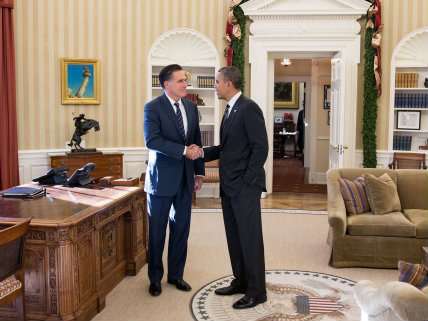Romney 2016: This Time Will Be Different! (But Not Really)
Different! In a different way! That's extremely, um, different...ish.
It looks we're in for a Romney trilogy: Since The Wall Street Journal reported last Friday that Mitt Romney, the GOP's 2012 presidential nominee and a 2008 primary contender, was considering another campaign, it's become increasingly clear that Romney is aggressively scouting a route to 2016.
The Washington Post reports that Romney worked the phones over the weekend, calling donors and allies in hopes of gauging support. This isn't idle interest. The burst of activity, the Post says, suggests that this weekend marked "the start of a deliberate effort by the 2012 nominee to carve out space for himself in an emerging 2016 field." Romney is for real.
Getting real means changing his tune. His 2012 presidential campaign left a lot to be desired. This time, he says, things will be different. Different how, you ask?
You know…different.
As Politico reports, Romney is promising a fresh campaign without really saying what he's got in mind:
Interviews with more than a dozen staffers and supporters who have recently spoken with Romney reveal conversations in which he promises a "different" path forward without providing specifics about what that means as far as mechanics and his own sometimes gaffe-ridden performance. And, aside from most of his communications team, Romney would still be expected to bring back the majority of his old staff, sources said.
So it'll be more of the same, but with different packaging. This is the wrong lesson of the 2012 campaign. Romney had a number of communications foibles, but his big problem wasn't communications. It was substance. The communications foibles arose in part because the messaging operation had so little to work with, and thus ended up distracted and unfocused, sucked into daily controversies that they couldn't respond to.
The campaign itself, meanwhile, undercut what was supposed to be Romney's chief virtue: his management prowess. The Romney campaign's voter-targeting system, ORCA, exactly the sort of high-end big-data system that you'd expect to be a strength for a former management consultant and equity mastermind like Romney, was woefully under-tested and totally failed on election day. The communications apparatus was hilariously over-managed and bureaucratic; by the end of the campaign, 22 people had to approve each and every Tweet.
That still didn't keep Romney's messaging on the road. He drove head-first into avoidable gaffe after avoidable gaffe, including his infamous remark about the "47 percent." While Romney's gaffes probably weren't decisive, they did tremendous damage to his campaign and made it hard to gather any kind of energy or momentum.
One specific way that Romney plans to run things differently this time is to, well, not do that this time. Back to Politico:
A senior Romney adviser in 2012 said the former Massachusetts governor would approach the primaries very differently "by virtue of experience," determined not to utter the kind of self-destructive statements he did last time in order to outflank his challengers on the right. For instance, in 2012, he suggested pursuing policies that lead undocumented immigrants to "self-deport" — a remark that cost him badly among Hispanic voters in the general election.
Here's the problem with this: Even if Romney manages to avoid these sorts of remarks this time around—and that's a big if, because every campaign provides a thousand new and unpredictable opportunities daily to put your foot in your mouth—Romney's verbal flubs from last time will still be on the record. He'll have to defend them or distance himself from them, repeatedly, and he'll have to do so without contributing too much to the not-insane perception that he's an ideologically unmoored flip-flopper.

Especially since there are hints that Romney plans to run as a conservative this time, or at least as more conservative than Jeb Bush, the former Florida governor whose own investigations into a presidential campaign seem to have spurred Romney's recent interest.
"Romney," the Post notes, "has tried to assure conservatives that he shares their views on immigration and tax policy—and that should he enter the race, he will not forsake party orthodoxy."
No, not Romney. He's not the kind of Republican who would, say, run for Massachusetts governor as a "moderate…not a partisan," call himself a "progressive," raise fees and end tax breaks to generate more revenue, and then sign into law a state-level health care law that would become the model for Obamacare, a law that he hoped for years would be implemented elsewhere in the nation.
Is that unfair? Obviously Romney wouldn't run that way this time around. He has changed (remember when he described himself as "severely conservative"?), or at least engaged in an ongoing self-editing process.
But in another sense, I think he hasn't changed, not really: He's still someone whose interest in running for and being president comes before any serious inkling about what, exactly, he'd do if he got the job, and he's still someone willing to overhaul his self-presentation in order to sell himself to whatever cohort he thinks is politically ascendant at the moment. So sure, the third installment in the Romney franchise would be different in the sense that every Romney reinvention is different from the last one. But in the ways that matter, every sign so far suggests it would just be more of the same.
